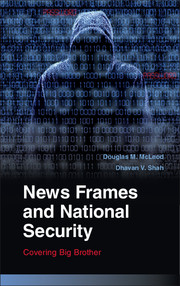Book contents
- Frontmatter
- Contents
- Preface and Acknowledgments
- Introduction
- Part I Conceptual Framework
- Part II Framing Effects Research
- 3 Designing the Studies
- 4 Converging Cues and the Spread of Activation
- 5 Cognitive Complexity and Attitude Structure
- 6 Security Concerns and Tolerance Judgments
- 7 Group Perceptions and Expressive Action
- Part III Implications and Conclusions
- Bibliography
- Index
6 - Security Concerns and Tolerance Judgments
Published online by Cambridge University Press: 18 December 2014
- Frontmatter
- Contents
- Preface and Acknowledgments
- Introduction
- Part I Conceptual Framework
- Part II Framing Effects Research
- 3 Designing the Studies
- 4 Converging Cues and the Spread of Activation
- 5 Cognitive Complexity and Attitude Structure
- 6 Security Concerns and Tolerance Judgments
- 7 Group Perceptions and Expressive Action
- Part III Implications and Conclusions
- Bibliography
- Index
Summary
“While the FBI possesses no information indicating that violent or terrorist activities are being planned as part of these protests, the possibility exists that elements of the activist community may attempt to engage in violent, destructive, or dangerous acts.”
– New York Times Bulletin October 15, 2003“‘Anti-terrorist’ legislation has been adopted in a number of western countries which allows for the arrest and detention without charge of alleged terrorists, including leaders of so-called ‘domestic radical groups’ (meaning antiwar activists), who are now categorized as a threat to Homeland Security.”
– Michel Chossudovsky Professor of Economics, University of Ottawa December 21, 2005The above passages illustrate how the focus of the government’s antiterrorism activities included political activist groups, who were being considered as a threat to national security. Documented cases of government surveillance and infiltration of nonviolent activist groups, including the Occupy movement, and the dragnet monitoring of Americans revealed by Edward Snowden (as detailed in Chapter 2) substantiate concern that the USA PATRIOT Act is being used to infringe on the privacy and due process rights of citizens, including political activists who may stake out extreme positions on issues but are not suspected of criminal activities.
Public response to this range of government surveillance activities is likely to be shaped by how they are portrayed by the media. We argue that the nature of news coverage about civil liberties controversies has the potential to sway individuals’ security concerns and social tolerance judgments. Our theory builds on past research that finds contemporary information works in combination with citizens’ political predispositions to shape the level of support for civil liberties (Marcus et al., 1995). However, this past research focused only on how individuals respond when confronted with disliked groups, arguing that it is under these conditions that the limits of tolerance are best understood (Sullivan and Marcus, 1988; Sullivan et al., 1979). An unintended consequence of this focus on disliked groups has been a dearth of research on how individuals make these judgments when they confront efforts to restrict the civil liberties of groups whose causes they support, but whose tactics they may oppose. The decision to defend the civil liberties of radicals, even if only for targets toward which one feels some latent sympathy, is a meaningful test of tolerance in the political climate created after 9/11 and typified by the Snowden revelations.
- Type
- Chapter
- Information
- News Frames and National SecurityCovering Big Brother, pp. 129 - 142Publisher: Cambridge University PressPrint publication year: 2014

